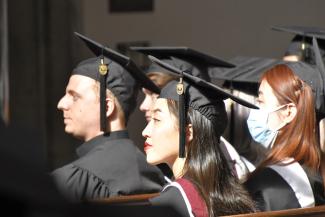
MAPH alumni have found success across a wide range of disciplines and professional fields. Here are just a few examples of recent alumni of the program, and some personal responses from their experiences both during and after their time in MAPH.
Mariah Bender (MAPH '22)
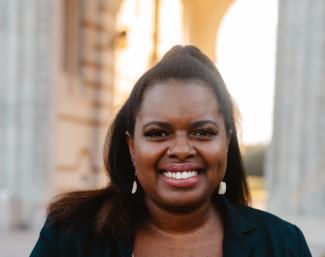
Concentrations: Race, Politics, and Culture; Divinity
Thesis: Tracing the Vèvè, Healing the Nation: Exploring Bakongo Cosmologies in Haitian Vodou
1. Tell us a bit about why you applied to and attended MAPH.
I applied to MAPH because I was really drawn to the possibility for an extended language program and a path which valued interdisciplinary scholarship.
2. What project did you design or develop in the program?
My thesis focused on the role of religious material culture in liberation and feelings of belonging, as well as national identity in Haiti.
3. What PhD program are you in now, and could you tell us a bit about your work there?
I am in a PhD program at Rice University for History, continuing the work from my MA thesis with my main advisor Dr. Daniel Domingues da Silva, whose work incorporates digital humanities on the Transatlantic Slave Trade.
4. Were there any faculty or courses that were key to your MAPH year?
I took a good deal of Romance language courses and I really enjoyed a course I took with Dr. Victoria Saramago on the Amazon in literature and film. Also, an anthropology course on the Caribbean with Dr. Ryan Jobson.
5. Could you talk a little bit about how the program helped you prepare for a
PhD?
The quick-paced classes and working on writing in small, accountable groups have been useful in my PhD program at Rice.
Abigail Anderson (MAPH '22)
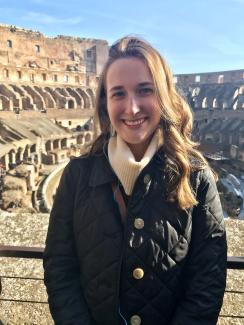
Concentrations: English, Gender and Sexuality Studies
Thesis: “We are a harvest of survivors:” Queering and Cripping Shame in Octavia Butler’s Parable of the Sower
1. Tell us a bit about why you applied to and attended MAPH.
I took my first gender and sexuality course my senior year of college and immediately fell in love, and though I tried to fit in many more before graduating, there was only so much I could do. As a result, I applied to MAPH to dive deeper into the subject and see if it were something I would want to pursue in a PhD program (in addition to my first love of English literature)!
2. Tell us a little about your current job/career.
I currently work as the Publications Production Coordinator at Dumbarton Oaks, a Harvard University research institute located in Washington, D.C. I manage the publication process for academic monographs in Byzantine, Pre-Columbian, and garden and landscape studies. Although I eventually decided not to pursue a PhD, I love working in academia, just in a different way!
3. Was there anything in MAPH that helped prepare you for the work you do now?
I worked as an editorial intern at Critical Inquiry the spring of my MAPH year, assisting with the research, copyediting, and proofing stages of production for journal issues. I had a wonderful time working with Hank Scotch and learned so much about academic publishing, and it was a great jumping-off point for the work I’m doing now!
4. Is there anything else you’d like to share about your time in the program (or the humanities as a career in general)?
My time in MAPH was one I’ll never forget. I got to learn so much and meet so many wonderful people, from my professors to classmates I now consider my best friends. It reinforced my love for the humanities, and because of it, I can now follow my passion.
Asya Sagnak (MAPH '21)
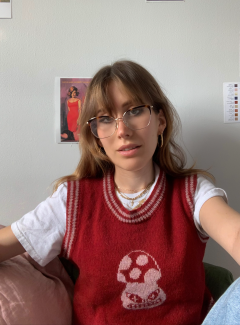
Concentration: Theater and Performance Studies
Thesis: Mortal Bodies, Immortal Song: Performing Hunger and Revelation in the Turkish Death Fast
1. Tell us a bit about why you applied to and attended MAPH.
I was a political science major in undergrad. I loved studying political theory, but I’d been trying to “find” performance theory (without even knowing what it was called!) and wed it to my political research for years. By the time I realized there was a whole field out there, I was already finishing up my last year of school. I was hoping for an MA program that would help me deepen that particular interest while putting me in the path of potential new ones. MAPH made sense!
2. What PhD program are you in now, and could you tell us a bit about what you are working on there?
I’m a joint doctoral student in Theatre and Performance Studies and Comparative Literature at UChicago. My research here focuses on the cultural and affective economies of self-harming protest performance, particularly in Turkey and the broader Middle East. I explore myths of sovereignty and individual self-boundedness; I’m invested in how performances of bodily decay challenge these, or work towards building collective subjecthood under the conditions of the carceral state. You can read more about it here.
3. Could you talk a little bit about how the program helped you prepare for a PhD?
MAPH was a great introduction to academic life. It also sparked other potential paths—via MAPH, I got a summer archiving position at the Seminary Co-op Bookstores—that I think I could’ve happily followed. More practically: my MA thesis was a useful starting point for my proposed PhD project, being around so many incredible thinkers made research feel alive and shared, and Agnes Malinowska's doctoral application support group kept me in check for application timelines.
Ronnie Malley (MAPH '23)
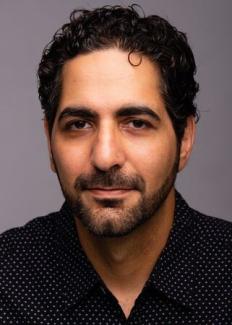
Concentrations: Near Eastern Languages and Civilizations, Linguistics, Music
Thesis: The Essentials: Sacred and Secular Music and Poetry from the Abrahamic Traditions of Andalusia, Spain
1. Tell us a bit about why you applied to and attended MAPH.
MAPH offered me many options as a graduate student. I was able to tailor my studies to suit my interests and create an interdisciplinary program across multiple departments including NELC, linguistics, and music. The Two-year Language Option (TLO) was an added bonus as I was able to continue my language and linguistics studies, one of the main reasons I wanted to attend UChicago. It was also very comforting to see such a robust compatibility among departments as opposed to the silos I have seen at other institutions.
2. What PhD program are you in now, and could you tell us a bit about what you are working on there?
I have been recently admitted to the PhD program in the UChicago music department to study ethnomusicology beginning the fall of 2023. Ethnomusicology is a highly interdisciplinary field that allows one to explore various aspects of cultures through music. I feel like my time in MAPH was a wonderful bridge to expand my love of languages with my profession as a musician, which is what I will be focusing on in the PhD program. Ultimately, my research will be a continuation of what I began in MAPH. I will primarily be working on researching the historic musical, poetic, and linguistic connections that exist between Arabic, Hebrew, and Latin derived varieties from medieval Spain. My work will also focus on what we can learn from the coexistence of these cultural elements and their relevance on relations among people in the Middle East, North Africa, and Europe in the modern day.
3. Could you talk a little bit about how the program helped you prepare for a
PhD?
The MAPH program was an excellent way to experience graduate school. I was able to formulate my ideas blending previous and future research interests into a coherent meaningful thesis project. I was also able to organize my thoughts and notes as well as learn incredibly useful techniques and technologies that aided in my research. Once I completed my thesis, which was almost guaranteed due to the support of the MAPH program, I knew that I wanted to continue onto a PhD program. I felt primed and prepared from what I gained and learned about myself in the MAPH program.
4. Is there anything else you’d like to share about your time in the program, preparing for the PhD, or being a researcher in the humanities in general?
Apart from the immensely kind, generous, and extremely knowledgeable faculty and staff, UChicago provided me with an immeasurable wealth of resources, networks, and perspectives to make me feel like I was intellectually growing. The importance of exploring the humanities and especially their role in extra-disciplinary fields cannot be overstated. While we can specialize in any field we choose, it takes the humanities to help us make meaning of what we learn.
